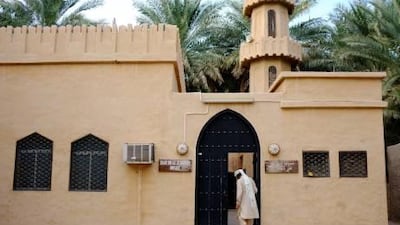AL AIN // It is one of Al Ain's least frequented mosques, a small building with a single minaret where no Friday noon prayers are held and where, in Ramadan, no iftar is served.
But that makes it no less important for a small community.
Nestled in the middle of the Al Ain Oasis, the Obaid Bin Ali Al Nasseri Mosque is one of three that serve the mainly Afghan and Pakistani community that tends to the palm and date farms there.
It is just an hour before iftar on the last Friday of the holy month and seven Afghan men are inside the 60 square metre prayer hall, kneeling on the maroon carpet and silently reading passages from the Quran.
Just above them are four window-style air conditioners. Around them the white walls are barren of Quranic verses or Islamic art.
It is a simple place and these men have been here for each of the past 26 days, aiming to read the holy book from cover to cover before the last day of Ramadan.
"Every day after 2.00 the faithful come together to read Quran and pray," says Mohammed Atequllah, 41, a Pakistani farmer. "There are other mosques here but this is the closest to the land I tend to.
"Today there are a few people here because it's Ramadan but usually the mosque is empty except during prayer times.
"It's small mosque but it holds a large place in our hearts. We are part of this community and this mosque is part of us."
The Al Nasseri mosque is the smallest of the three in the Al Ain Oasis, mainly serving those within a short walking distance along cobbled roads barely wide enough to drive a large vehicle through.
The path to the mosque from inside the oasis is shaded and cooled by overhanging palms, the fronds on which bend down forcing walkers to push past or duck underneath.
"Coming to the Al Nasseri mosque is part of my daily routine," says Sohaib Al Hassan, 52, an Afghan farmer. "I come here five days a week to pray and meet my friends.
"Each mosque here has its own congregation but on Fridays for the noon prayers, everyone from the oasis goes to the Sheikh Mohammed Bin Khalifa Mosque - that's the big mosque here. Every day during Ramadan there is an iftar held there.
"But during the rest of the week we are at the Al Nasseri mosque."
Samir Noor, 32, an Egyptian civil engineer is visiting his brother in Al Ain and stops at the mosque. "When I saw the mosque, I wanted to see what it was like inside," Mr Noor says.
"From the outside it appears to be made of clay but it's really not. It was built with cement bricks and covered over by clay to give it a more traditional look.
"It's not particularly ornate but its beauty comes from its simplicity. It's the perfect mosque for a small community."

